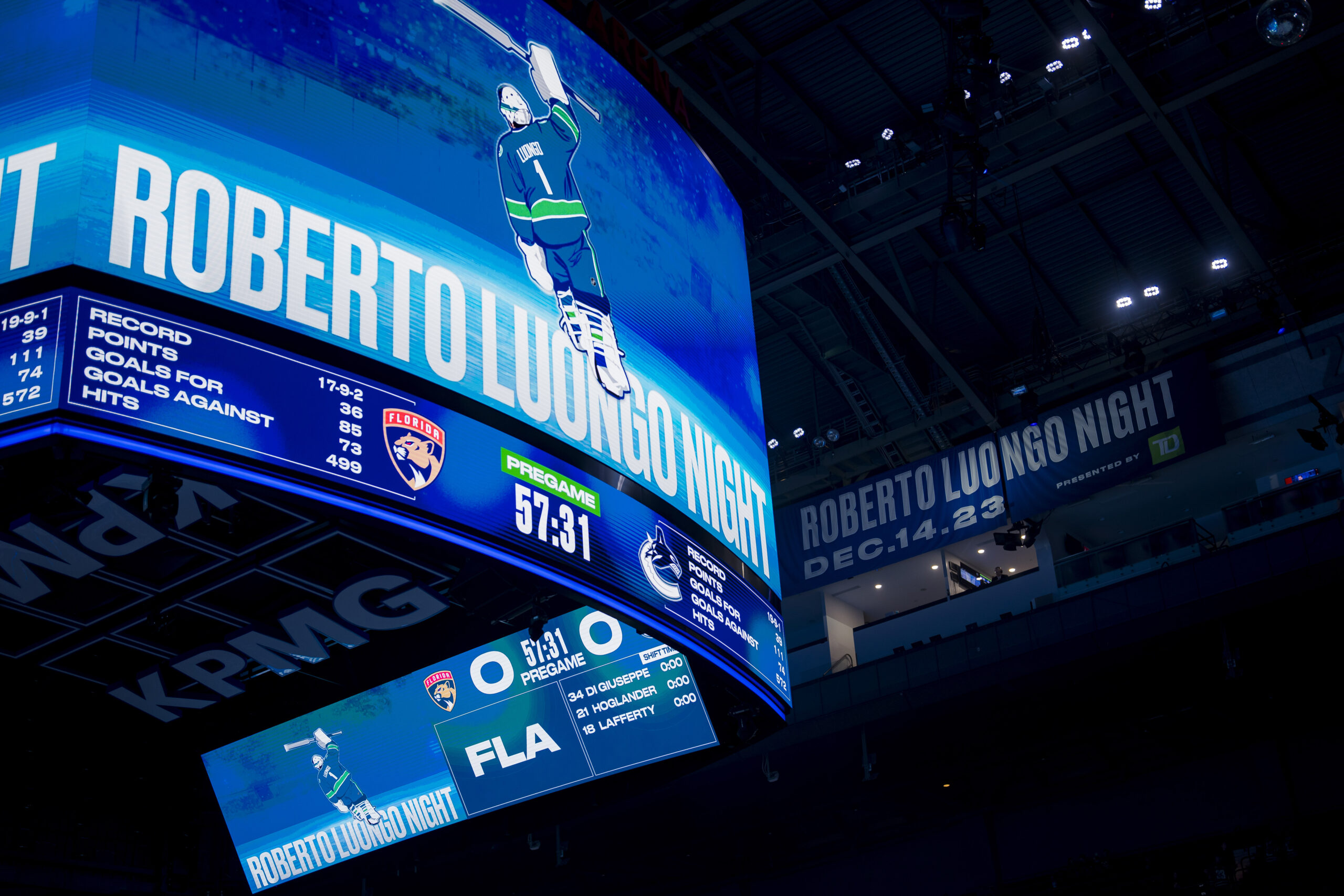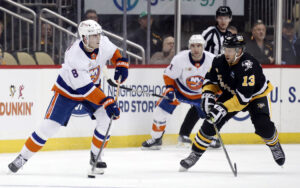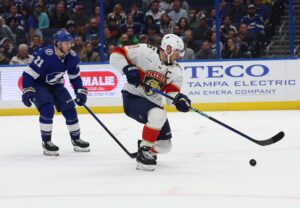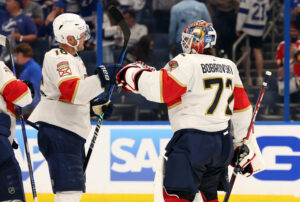Three times the Vancouver Canucks have reached the Stanley Cup Final. All three times, it was the Canucks playoff goalies who got them there. We’re going to have a look at Vancouver’s OTHER Stanley Cup Final runs and their star netminders.
These Canucks Playoff Goalies Are Legends
Can any Canucks goalie be considered a playoff “legend” if none of them have won the Cup? Well, the thing about legends is that local ones are determined locally. They emerge because people decide to elevate them, not because there’s a minimum standard to reach.
With the recent celebration of Roberto Luongo‘s Ring of Honour placement, Vancouver’s goalie history is on our minds. Ever since it was announced that his number wouldn’t be retired but still honoured, there has been – surprise! – controversy.
Goalie controversies permeate Vancouver like a cross-cultural trade language. If you’re on the Skytrain and have nothing else to say, you can always start a conversation with “How about the Canucks goaltending, eh?”
There’s going to be an opinion from the other person. Possibly many opinions, and possibly from many persons, so use this with caution in public spaces. The next sound you’ll hear is whatever their version of the “Let me tell ya, buddy…” grunt is.
King Richard is Crowned
Richard Brodeur was a New York Islanders fifth-round draft pick in 1972, two years after Vancouver played their first NHL game. Rather than join the Islanders, Brodeur chose to play in Quebec with the World Hockey Association’s Quebec Nordiques.
He won the Avco World Trophy there, and when the two leagues merged was one of their protected players. He never played for the NHL Nordiques, however, getting traded to the Islanders in 1979. That was a hard call for Brodeur, as he was stuck behind the established Glenn Resch (“Chico”) and the legendary Billy Smith.
He played just two games with the Islanders in 1979-80. That offseason he was sent Vancouver’s way with a fifth-round pick in return for Vancouver’s own fifth. Brodeur was the cost for New York to move from 105th to 94th.
Brodeur’s line with Vancouver was 126-173-62 over parts of eight seasons. He managed a .872 save percentage and 3.88 goals-against average. He’s probably most famous outside Vancouver for being the goaltender Wayne Gretzky has scored the most goals against: 29.
His best season, however, just happened to coincide with the Canucks first miracle run.
Miracle on…Renfrew?
The Canucks had made the playoffs six times in their first eleven years. Not too bad, until you remember that eight out of fourteen – then 12 of 18, then 16 of 21 – teams made the playoffs every year.
Brodeur’s .893 SV% and 3.36 goals against were his best ever in the NHL. Solid, top-10 numbers in the league, but nothing spectacular. For the most part, Vancouver scored their way to wins, if they got them.
In 1981-82, the Canucks finished second in the Smythe Division and fourth in the Campbell Conference with 77 points. In theory, the division was Edmonton‘s to lose, but a funny thing happened on the way to the Stanley Cup…
Vancouver managed a tight, three-game sweep of the Calgary Flames in the first round. Brodeur’s save percentage reached a modest .954%. And for a bit of flavour, it should be noted the Canucks received 116 minutes in penalties in those three games. Different times, them.
With Edmonton gone, Los Angeles was next. Vancouver finished them off in five games, and Brodeur’s save percentage plummeted to .920%. It’s one thing to keep Mel Bridgman and Guy Chouinard under control. It’s quite another when you’re facing Marcel Dionne and Dave Taylor.
Next was five games against Denis Savard and Doug Wilson, but the result was the same. Brodeur kept his average up at .925% and the Canucks took 283 minutes in penalties, but they reached the Final.
Canucks Run Aground
All dreams end, and the astounding Islanders ended Vancouver’s. Brodeur did what he could, but there are only so many miracles against Denis Potvin, Mike Bossy, Clark Gillies, and Bryan Trottier.
On the other end of the ice waited their fifth Hall of Fame player. He was, of course, the one who kept Brodeur from launching his NHL career – Billy Smith. Thomas Gradin and Stan Smyl, for all their heart, weren’t enough.
Vancouver hit the wall that was the New York Islanders dynasty. It was the third of four consecutive Stanley Cup wins, and it would take a lot more than what the Canucks could bring to take them down.
The Canucks won a playoff series for the first, second, and third time in their history, all in 1982. They did it by playing three teams who finished below them in the overall standings, sure. But “King Richard” Brodeur is the first of the Canucks playoff goalies to have gotten them even one series victory, and he brought them to the Stanley Cup Final.
Captain Kirk to the Bridge
That season would contain Vancouver’s only playoff series wins until 1991-92. That year, the team was guided by Kirk McLean, who had the advantage of a much stronger team in front of him.
Vancouver traded for McLean – a fifth-round pick of the New Jersey Devils – by sending away Patrik Sundstrom a second- and a fourth-round pick in 1988. They also got back a second-round pick and talented winger Greg Adams.
If that seems like a steal to you, eventually it was. But Sundstrom was a point-per-game centre, and Adams had a down year after a fantastic start. So there was some risk involved. The Devils also had a pile of young goalies and felt they could afford to move one.
McLean’s numbers, like Brodeur’s, are fairly modest. In 11 seasons with Vancouver, he went 211-228-62 with a .887 save percentage and a goals-against of 3.28. His career was at that transition point where higher than a .900 save percentage went from being top-ten numbers to an expectation.
Crawling Before You Can Fly
Vancouver improved dramatically in 1991-92 and 1992-93. They hit a team-best 96 points first, winning their first playoff round in a decade. That was followed by their very first 100+ season, reaching 46 wins and 101 points in 84 games.* But the next year is when the magic happened.
For the 1993-94 season, the Canucks soared all the way to 85 points. Yep, they barely crawled over the .500 mark with a 41-40-3 record. McLean himself had a 2.99 goals against and an .891 save percentage – two very mediocre figures across the league.
Vancouver did enter the playoffs with some star power, led by 22-year-old 60-goal scorer Pavel Bure. Their first opponent, on the other hand, had three 40-goal scorers and a 36-goal scorer. The Calgary Flames won the Cup in 1988-89 and were still extremely dangerous.
It was a wild series and one that remains cemented in many fans’ heads. Vancouver won the first game 5-0, then dropped the next three. That led not only to a three-game comeback but a three-overtime game comeback.
That Game Seven was into double overtime with McLean stopping 46 of 49 shots and a winning goal from Bure made it all the sweeter. After that confidence-boosting victory, the next two rounds were a virtual breeze.
Set ‘Em Up, Set ‘Em Up!
The Dallas Stars, unlike the Flames, had one main scorer and the rest of the attack came from a balanced team. Mike Modano led the way, but then there were a dozen more double-digit scoring threats behind him.
They were no match for McLean. He dialled up a .940 save percentage against them, and the Stars were done in five. Modano was contained, and Bure wasn’t. It was a recipe that worked.
The same could be said of the top-heavy Toronto Maple Leafs, who had one incredibly dangerous line. Doug Gilmour, Dave Andreychuk, and Wendel Clark had 27, 53, and 46 goals respectively in the regular season. No one else had 20, though. Glen Anderson hit 17, but only three others even had 10.
Second verse, same as the first: that one line was contained, and McLean did the rest. He reached a .947 save percentage and had two shutouts. Five games later, McLean was the second of the Vancouver Canucks playoff goalies to reach the Stanley Cup Final.
Oh. Him.
Unlike the previous time, the Canucks beat three teams who had finished above them to reach the final. The New York Rangers though, with the excellent Mike Richter between the pipes, were something different.
They finished the regular season with 112 points, best in the league. Mike Gartner was gone, but they still had five Hall of Fame players. Mark Messier had made his famous guarantee the previous round. This wasn’t a Final, it was a Coronation and ending 50 years of futility.
Vancouver disagreed, winning the first game in New York in overtime. Once again, McLean was brilliant, stopping 52 of 54 shots. The Rangers buckled down, taking the next three and heading back to New York expecting not to fly again.
A brawling, scoreless first period in Game Five ended with an eight-goal third, and Vancouver kept the series alive. They took the next in Vancouver, and Messier refused to give another guarantee before heading home.
The Canucks would terrify, but couldn’t quite finish the Rangers, dropping Game Seven 2-3.
This year, in these playoffs, Kirk McLean went toe-to-toe with the best in the league. Like Brodeur, he played every minute of their run, compiling a .928 save percentage and 2.29 goals against average.
Remembering the Canucks Playoff Goalies – and More
Thatcher Demko may well help lead the Canucks deep into the playoffs once again. The team in front of him looks promising, and he certainly has the skills. And maybe, if he does, he’ll manage one more win than previous runs.
But until then, it’s worth remembering why there was a debate about whether Roberto Luongo should or should not have his number retired. He was clearly better than any goalie the Canucks have ever had, that’s not a question. But sports is also about emotion, not just numbers.
For a city with a 50+ year-long NHL history, it has very few memories of the second season. Appearing twice in a decade will hardly produce any Canucks playoff goalies who can bring the city to its feet.
These two goaltenders may have played long before Vancouver’s 2011 Stanley Cup Final run, but they are not forgotten. Those two let a city dream, however briefly, and it was amazing.
And that is worth remembering.
*Yes, 84 games. Don’t ask.
Main Photo Credit: Bob Frid-USA TODAY Sports






